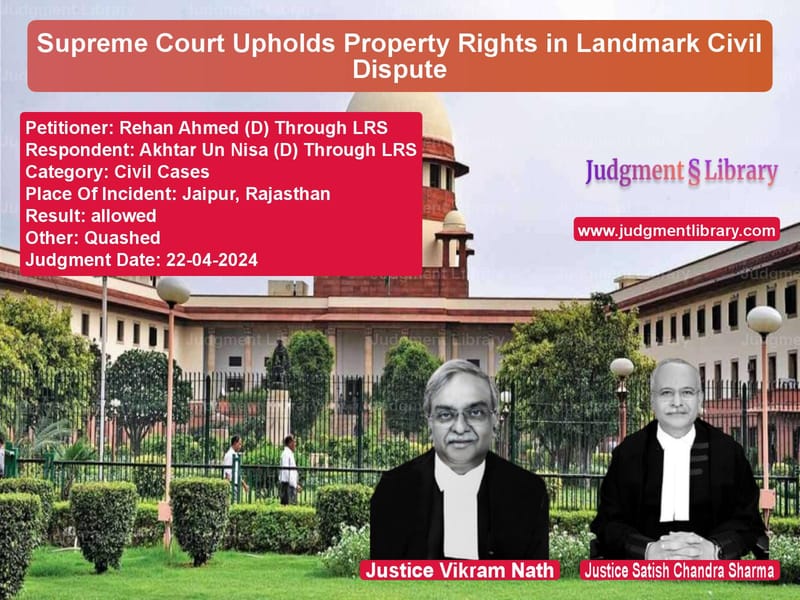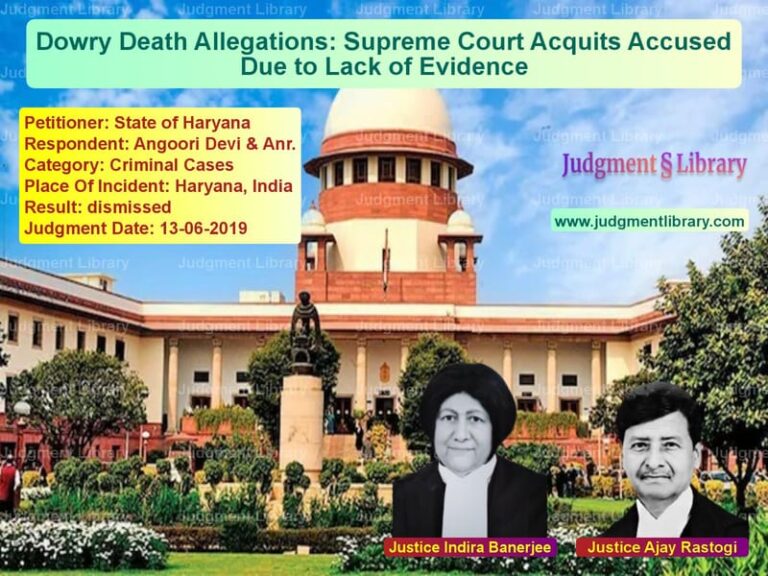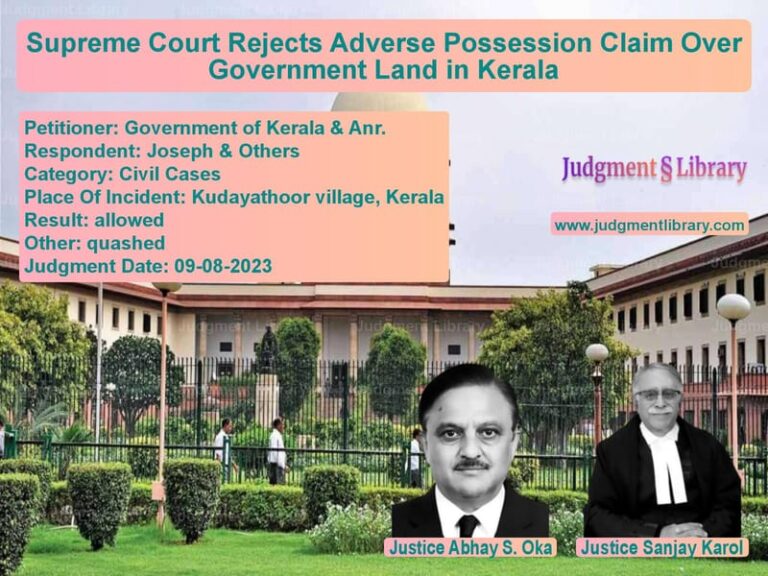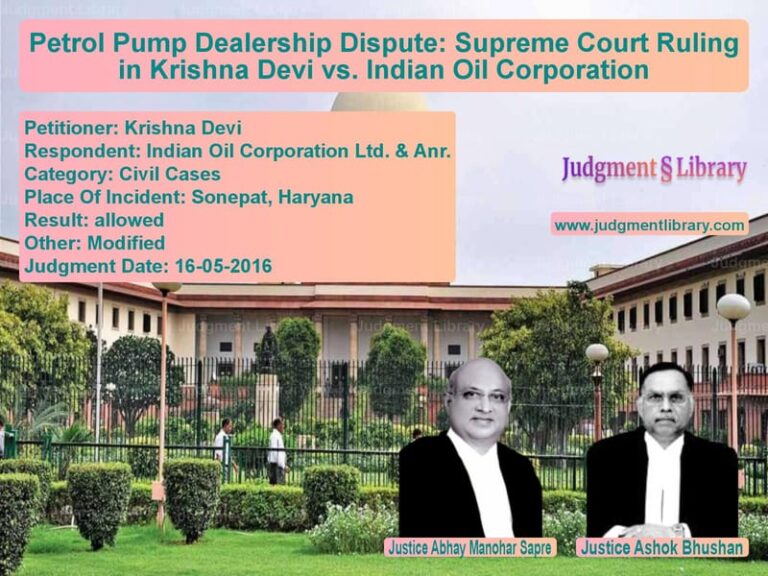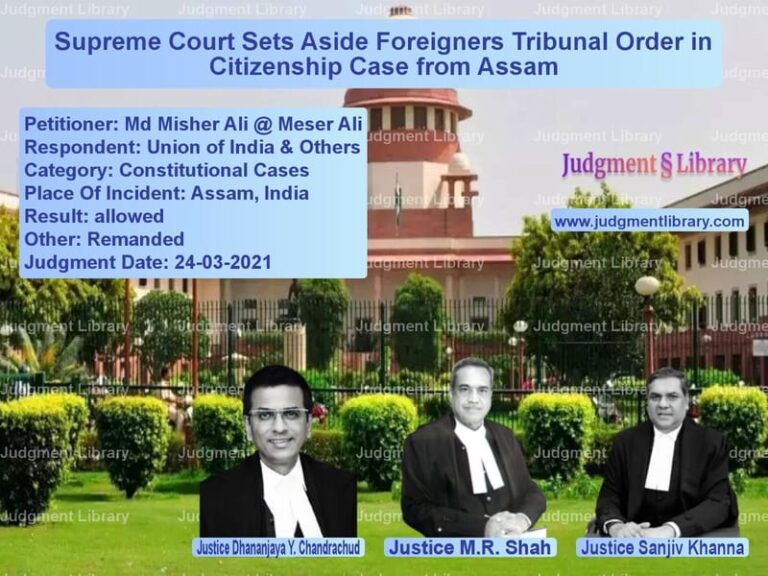Supreme Court Upholds Property Rights in Landmark Civil Dispute
The case of Rehan Ahmed (D) Through LRS vs. Akhtar Un Nisa (D) Through LRS revolves around a long-standing civil dispute regarding the execution of a sale deed based on a 1978 compromise agreement. The Supreme Court was called upon to determine whether the execution of the decree for specific performance could be enforced or whether it had become null and void over time.
Background of the Case
The dispute concerns property located at Municipal Nos. 52-57, Maniharon Ka Rasta, Jaipur, originally owned by Ghulam Mohiuddin (Defendant No.1). On October 4, 1967, an Agreement to Sell was executed by Saeeduddin (Defendant No.2), acting as the power of attorney holder for Defendant No.1. However, the sale deed was never executed, prompting the appellant (Rehan Ahmed) to file a suit for specific performance in 1972.
During the course of the suit, the parties reached a compromise agreement on May 11, 1978. The agreement acknowledged the validity of the sale and outlined the conditions for transferring ownership. Key terms included:
- Defendant No.1 admitted the agreement’s validity.
- The total sale consideration was fixed at Rs.40,000, of which Rs.15,000 had already been paid.
- Defendant No.1 agreed to execute the sale deed by July 1, 1978.
- Defendant No.2, who was residing on the third floor, was to vacate the premises.
Despite the compromise, Defendant No.1 failed to execute the sale deed. Consequently, the trial court passed a decree for specific performance on May 9, 1979, allowing the plaintiff to enforce the sale deed through execution proceedings.
Legal Proceedings and Execution Challenges
- In 1998, Defendant No.1 challenged the execution, arguing that the delay had led to a significant increase in property value.
- The Executing Court rejected the objections, ruling that Defendant No.1 had failed to comply with his obligations.
- In 2006, another legal heir, General Tariq, filed a similar objection, which was dismissed by the Rajasthan High Court and the Supreme Court.
- In 2007, a fresh set of objections was filed by Akhtar Un Nisa, the wife of Defendant No.2, claiming that the compromise decree was invalid because Defendant No.2 had not signed it.
The Rajasthan High Court accepted these objections, ruling that the decree was null and void. The case was then brought before the Supreme Court.
Arguments by the Appellant (Rehan Ahmed’s Legal Heirs)
- The High Court had wrongly declared the decree null and void, despite prior rulings upholding its validity.
- Defendant No.2 had already admitted that he had no ownership rights over the property.
- The trial court had properly recorded and verified the compromise agreement.
- There was no justification for reopening execution proceedings that had been upheld multiple times.
Arguments by the Respondents (Legal Heirs of Defendants)
- The decree could not be executed because Defendant No.2 had not signed the compromise agreement.
- The execution was delayed for decades, making it inequitable to enforce the decree.
- The compromise agreement did not comply with the procedural requirements of Order XXIII, Rule 3 of CPC.
Supreme Court’s Analysis and Judgment
The Supreme Court found multiple errors in the High Court’s reasoning:
- Defendant No.2 had no ownership rights: “The family arrangement from 1976 and Defendant No.2’s own admission prove that he was not an owner, making his signature unnecessary.”
- The decree was upheld in previous proceedings: “The execution process had already been challenged and dismissed multiple times, making the fresh objections untenable.”
- Procedural compliance was met: “The compromise was duly recorded and verified by the trial court, fulfilling the requirements of CPC.”
Based on these findings, the Supreme Court ruled:
“The High Court’s judgment is unsustainable. The decree is valid, and execution must proceed.”
Supreme Court’s Final Order
- The appeal was allowed.
- The Rajasthan High Court’s judgment was set aside.
- The decree for specific performance was upheld.
- The objections under Section 47 CPC were dismissed.
Legal Implications of the Judgment
- Once a decree is upheld in previous litigation, fresh objections cannot be entertained.
- Compromise agreements, once verified, cannot be challenged decades later.
- Legal heirs cannot introduce new arguments that contradict prior admissions.
- Execution of decrees must be enforced, even if there is a long delay.
Conclusion
The Supreme Court’s ruling reaffirms the enforceability of compromise decrees and protects property buyers from prolonged litigation. The decision ensures that execution proceedings remain final once upheld by higher courts.
Petitioner Name: Rehan Ahmed (D) Through LRS.Respondent Name: Akhtar Un Nisa (D) Through LRS.Judgment By: Justice Vikram Nath, Justice Satish Chandra Sharma.Place Of Incident: Jaipur, Rajasthan.Judgment Date: 22-04-2024.
Don’t miss out on the full details! Download the complete judgment in PDF format below and gain valuable insights instantly!
Download Judgment: rehan-ahmed-(d)-thro-vs-akhtar-un-nisa-(d)-t-supreme-court-of-india-judgment-dated-22-04-2024.pdf
Directly Download Judgment: Directly download this Judgment
See all petitions in Property Disputes
See all petitions in Specific Performance
See all petitions in Contract Disputes
See all petitions in Judgment by Vikram Nath
See all petitions in Judgment by Satish Chandra Sharma
See all petitions in allowed
See all petitions in Quashed
See all petitions in supreme court of India judgments April 2024
See all petitions in 2024 judgments
See all posts in Civil Cases Category
See all allowed petitions in Civil Cases Category
See all Dismissed petitions in Civil Cases Category
See all partially allowed petitions in Civil Cases Category

